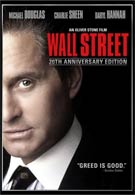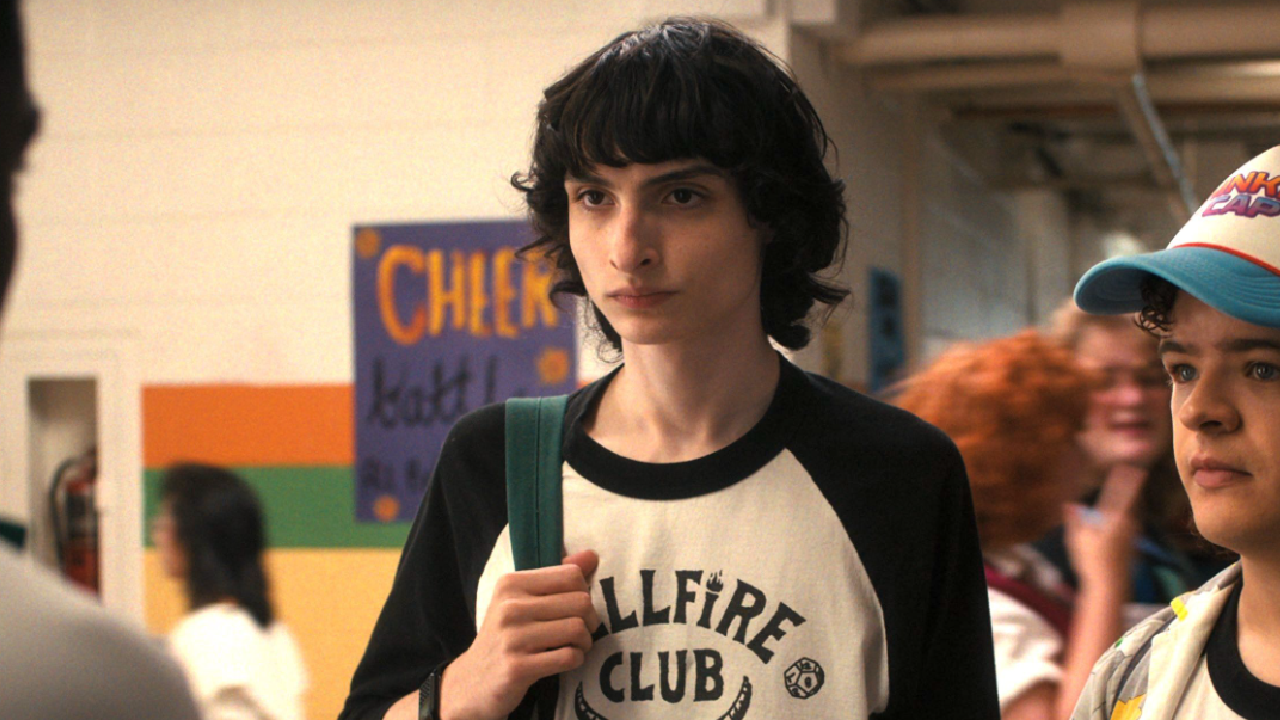Greed is good. Greed works. Those words will resonate through your mind like a Tony Robbins speech gone bad. But, there is some truth to those words. Greed can be good, and it can work, but in moderation. As famous one gambler once said, “You’ve got to know when to hold ‘em, know when to fold ‘em, know when to walk away and know when to run.” Greed is gambling with things you possess and, sometimes, with things you don’t. While money will bring you lots of joys and lots of material, it is not what makes the man or woman you become. Tired of the view from his one-bedroom rental in one of Manhattan’s not-so-affluent areas, Bud Fox (Charlie Sheen) dreams of a living a life of luxury, style, and power as one of the elite investment bankers on Wall Street. Through persistence and a little luck, he manages to charm his way into a meeting with the biggest player in the game, the man he has idolized and followed for years, Gordon Gekko (Michael Douglas).
Gekko begins running Fox through the ringer, making sure he’s fit to run with the big boys. As Gekko tests Fox, he teases him with the perks he could have if his money is invested the right – women, limousines, power and more money than he could have ever dreamed of having. It’s not long before Fox is rubbing shoulders with the big-wigs of Wall Street, making “friends” in the highest of places, and taking part in the illegal practice of insider trading. But in a world that moves fast and values the color green more than it does ethics, Fox finds himself in an awkward position that will put him between his hard-working, morally strong father (Martin Sheen), and his mentor, where he has to make a decision between right and wrong, ethical or immoral.
Wall Street is a great example of a good movie that is taken to new levels by one character. Douglas, who won an Academy Award for his performance, makes you understand exactly what it’s like to work in a fast-paced world with all the money and power you could ever imagine. He’s greedy, he’s arrogant and he doesn’t have time to dilly-dally with people he considers small-time that have no “information” for him. To say Douglas is perfect for this role would be an understatement. He has the good looks, the voice, the stature and the ability to come off smug and tough. There is no sensitivity in this role because the truth is, Gekko doesn’t have time to think about feelings – his, or anybody else’s. The man is a machine. Time is money and every deal or acquisition is a war – a war he is not willing to lose at any cost. Douglas, with his slicked back hair and expensive suits, makes this character to be the cold, heartless villain he was meant to be.
Fox, on the other hand, is an impatient kid with big ideas and a great deal of potential. The only problem, at least in Gekko’s world, is that he has a heart underneath the yuppie exterior he’s looking to build on. Despite all the lectures from his father, a union leader for workers at a flailing airline, that money doesn’t make the man you are, Fox continues to dream of the luxury penthouse and the dream he eventually gets in Darien (Darryl Hannah). In essence, he wants everything Gekko has and eventually finds himself willing to do anything to merely become his clone. Sheen plays him perfectly – he’s smart, but has a lot of inexperience. He has the drive, but he’s in the game for all of the wrong reasons.
Academy Award-winning director Oliver Stone creates a world that is straight-forward, real and never too flashy. The subject matter and the lingo may be complex, but Stone manages to keep us in the game, no matter how fast it is going. It is a whirlwind tour of a fast-paced society that is often filled with clichés, and Stone uses smooth camera work and a consistent script to properly display a kill-for-the-buck attitude.
There are other stellar performances that help drive this film, most notably from Martin Sheen as Carl Fox. He doesn’t have much screen time, but in the moments he is on the screen he delivers his message – and never budges from his beliefs, even when faced with losing his job, and the jobs of his “men.” He stares Gekko and a version of his son that he doesn’t like right in their faces and holds his own. It is an underrated performance with a bold message that chooses the simple life over the “good” life or fortune and power. Other cast members that play small, but important roles in making this film tick include John C. McGinley, James Spader and Hal Holbrook as Lou, the old wise man in Fox’s office that is always seen, but often ignored.
The only performance that lacks any substance is that of Daryl Hannah’s. You know why she is in the film: she’s tall, blonde and beautiful. The only thing her character does, however, is slow the film down from it’s frenzied pace. Part of the message of the film is that love doesn't work in this high-powered life, and that is why that part of the movie doesn't work for me. These people are driven by what they do, and slowing down for the illusion of love is just wasting time. It isn't a huge portion of the movie, but it does waste time – and I’m sure money.
Maybe I’m just starting to think a little bit like Gekko – getting a little greedy with my time and how I choose to spend it. I like to know what I am getting myself into at all times, especially when there are risks involved – or illegal procedures that could bring trouble into my future. But, one thing is for sure: purchasing the 20th anniversary edition DVD of Wall Street is a wise and sound investment. I am never going to complain about getting more bang for my buck, especially when it comes to a movie and its special features. But, seriously, do we need two discs for a total of five features? To tell you the truth, it’s kind of annoying. Maybe I’m just lazy, but I don’t want to get up just to put in another disc and watch something that should already be in the section marked special features. Yes, adding another disc makes things feel more “special,” but all it really becomes is a “special” pain in the butt.
On the main disc, when you go to the special feature section, you have one option: watching the main feature of the film with the commentary of Stone. Being that Wall Street is an exciting film, it is good to hear what Stone wants to get out of certain scenes, and what his motives are when dealing with Fox and Gekko’s relationship. And, when listening to the director of Natural Born Killers, Born on the Fourth of July, and Platoon speaks, you will listen to every word he says. It is a great feature.
When you get up to switch over to the second disc of features, you are greeted by a menu of four items as the same, fairly annoying music plays in the background. The music is cool at first, but if you let it play in the background while, let’s say, typing, it becomes annoying after a while. The first feature is an “Introduction by Oliver Stone,” and it is a great one minute feature, mainly because it is new, fresh and has the director giving a brief, not longwinded, history of the movie he made 20 years ago.
The “Greed is Good” documentary is the perfect way to celebrate the 20th anniversary of Wall Street. It is not a series of interviews from 1987, when the film was released, but it is a 57 minute series of interviews with stockbrokers and analysts, Stone, Holbrook, McGinley, Charlie Sheen and Douglas that takes you through the entire movie. This feature truly pays tribute to the movie in the right way, and if you are a fan of this movie, you will be a big fan of this feature.
The other big feature on the disc is called “Money Never Sleeps: The Making of Wall Street.” This is your typical HBO-like “Behind the Scenes,” type of feature that was made 20 years ago. It contains the grainy stock footage you’d expect to see on a VHS copy of Wall Street, and interviews done when the movie was first made. For those of you who are nostalgic, it is a great feature that will take you back 20 years, and you can see a less-aged Douglas, Sheen and Stone speak about what it was like to make this movie. It’s another great addition to the list of special features – on the second disc.
The final feature is 22 minutes worth of deleted scenes that you can watch with or without Stone’s commentary. I, personally, suggest you watch it with the commentary because it is more interesting to hear why it didn’t make it into the film, as opposed to watching the scene and thinking, “Hey, that could have worked.” It’s always better to listen to the commentary on the deleted scenes because more insight is given into the thought process of putting a movie together.
Despite my problem with having to change discs in the middle of watching the special features, I am not disappointed by anything in the set. The most important thing is that all of the features were fresh. They are not re-runs from previous editions of the DVD, but brand spankin’ new features made just to celebrate this occasion. And while they are celebrating the 20th anniversary of a great movie, they do not go overboard and load you with a ton of features you probably will never care about, like some movies, especially special editions, tend to do. Not Wall Street, though. Remember, time is money, and while greed is good, sometimes what you have in front of you is more than enough.
Finn Wolfhard Had An 'Emotional Hangover' After His Last Day On Stranger Things, And I'm Having My Own After Seeing His Comments On It
As A Star Wars Horror Project Is Reportedly In The Works, I Have An Idea That Would Make For A Chilling Movie
I Have One Gripe About Black Mirror's Plaything, And It Involves Will Poulter











